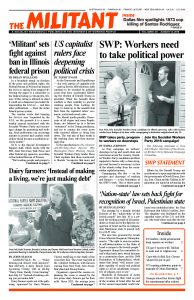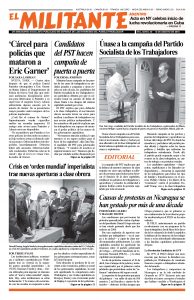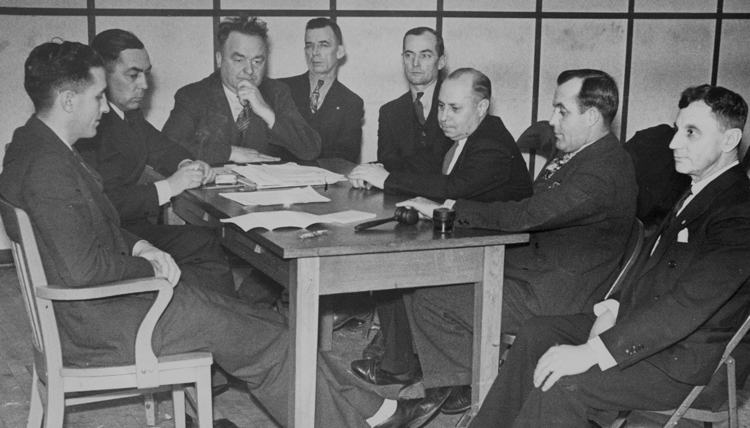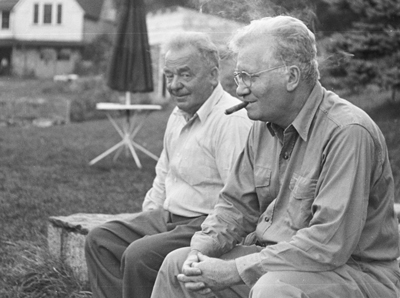Below is an excerpt from an April 1954 speech by James P. Cannon, a founding member of the communist movement and National Secretary of the Socialist Workers Party. He wrote it for presentation to a class of students at the party’s leadership school to honor Carl Skoglund on his 70th birthday. It is printed in Speeches for Socialism, one of Pathfinder’s Books of the Month for August.
Skoglund was in his 20s when he came to the U.S. from Sweden and never had what the U.S. government considered proper documentation, living with the threat of deportation all his life. During the 1950s it came close when immigration cops hauled the revolutionary leader onto a ship in defiance of a court order. Ten minutes before being deported, protests forced the cops to comply with the judge’s order and bring him back ashore. Copyright © 1969 by Pathfinder Press. Reprinted by permission.
This jubilant birthday celebration is testimony that Carl Skoglund has done pretty well for himself in this country, considering the fact that he got started off on the wrong foot and has been standing on it — so to speak — ever since. He picked Sweden for his birthplace, without realizing that Swedish birth does not confer the right to live and breathe in this country.
Nobody told Skogie that he had made a mistake, and he didn’t ask. He arrived on these shores in 1911 and, finding the gates open, just walked in. He has been traveling around the forty-eight states for forty-three years without proper identification papers. This sort of thing couldn’t go on forever.
Thirteen years ago, the authorities picked him up and checked their files and made an alarming discovery, which has been troubling them ever since. They looked through a thick dossier marked “Skoglund, Carl” — and what did they see?
They saw that his doings and wanderings had been under observation for a long, long time; and none of the previous investigators, who had left their grimy thumbprints on the records, had had anything good to say about him. The record showed that he had always worked for a living, a very suspicious occupation for a red-blooded American. Nobody ever got rich and won the right to wave the flag by chopping down trees, fixing automobiles, driving trucks, heaving coal and working on the railroad to make the trains run on time. But that’s what “Skoglund, Carl” had been up to in these United States.
The record shows further that he had been a labor agitator, strike leader, Socialist, Communist, and general troublemaker, kicking and complaining all the time about the way things are run in this country. That was bad enough, for every right-thinking American knows that things couldn’t be better. But while the official headshakers were shaking their heads over the long list of bad reports about the man under investigation, they accidentally stumbled over a still more suspicious dereliction.
In ransacking the voluminous files of the Immigration Department, the Department of Justice, the FBI and the local constable, they found plenty of incriminating reports. But there was one thing they couldn’t find. That was any definite proof that the subject of their inquiry had any legal existence whatever. There was no birth certificate, no entry permit, no passport, no certificate of naturalization. Nothing at all.
By the absence of any proof to the contrary, they established the fact that “Skoglund, Carl,” who was standing right there before them, had no legal right to be there or anywhere else. Officially, he was not in this country and never had been. He stood before his inquisitors naked, without an identification paper to his name. Nevertheless, they had to tag him some way. So they just wrote down on the cover of the dossier, under the name of “Skoglund, Carl,” in bright red ink: “Has no papers.”
This was an absolutely intolerable situation, for how can this country stand if Skoglund’s records are not in order? Something had to be done about it. The first thing that entered their minds, naturally, was to throw him into jail. Then his friends posted bond for him; and that created another problem for the department in charge of putting people in the right place and making sure they don’t pop up in the wrong place.
The man who had no papers had no right to be footloose in this country; but, since bond had been posted, they had no right to keep him in jail either. It was a hell of a mess, and it hasn’t been straightened out yet. The whole ponderous machinery of the United States government has been working ever since to put the man who is here but shouldn’t be, in some place where he should be, but isn’t. But they have never yet been able to get the time and the place and Skoglund all together.
So it turns out that, while the mills of justice grind so slowly to a final decision in his case, we have him here with us on his seventieth birthday. …
[Frederick] Engels said of the theory you are studying that it is not a dogma, but a guide to action. His reference was to the action of the masses in the class struggle; a warning that the revolutionists cannot substitute themselves for the masses, but can realize their theory only with the masses and through their action. Carl Skoglund, the socialist mass worker who carried the living theory of Marxism into the labor movement, is the example par excellence of Engels’s words.
But Engels’s maxim can apply also to the individual’s application of the theory in his own life, his own action. It is not enough to know the Marxist formulas. Not a few scholastic bystanders know the theory of Marxism, as it is written in the books; but that does not make them Marxists. The real Marxist, that is to say, the revolutionist, is one who — to quote [Leon] Trotsky — assimilates the formulas into his flesh and blood; who not only knows the doctrine but lives by it and for it.
Here again, comrades of the Trotsky School, your guest of honor today is your best example. In Carl Skoglund you see a man who has lived a consistent socialist life under all circumstances, and has asked no other compensation than the satisfaction of serving the socialist cause. He has lived to see his life and his labor crowned by many achievements, which are lodged in the foundations of our great movement.



